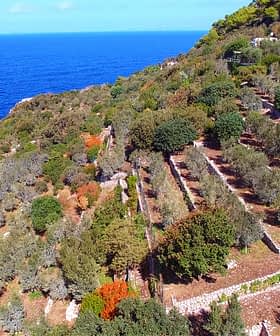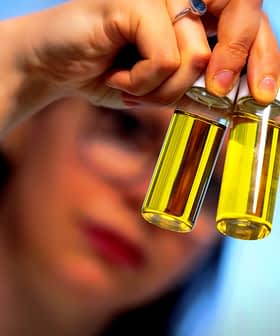Oleocanthal, a Polyphenol in Olive Oil, Positively Impacts Human Melanoma Cells
According to new research, oleocanthal may be a potent anticancer agent for aggressive melanoma skin cancers.
One of the most aggressive, chemoresistant forms of cancer is malignant cutaneous melanoma. There are some treatment options available including injection of inflammatory molecules, along with oral and topical agents, which is where extra virgin olive oil polyphenols may play a key role.
Oleocanthal, one of the most recognized polyphenolic compounds in extra virgin olive oil, was discovered by Gary Beauchamp during an experiment to improve the taste of ibuprofen.
See Also:Olive Oil and Cancer Treatment and Prevention
While researching molecular gastronomy with a team of scientists, food specialists and chefs, Beauchamp was conducting an olive oil tasting when he noticed some similarities between the taste of a particular olive oil and the ibuprofen.
Researchers have established its ability to provide potent anti-inflammatory properties, which inhibit cyclooxygenase enzymes in the same way as NSAID ibuprofen. Other studies have demonstrated extra virgin olive oil to be helpful in brain cancer chemoprevention, in reducing invasive breast cancer, in reducing breast cancer relapse, and in playing some role in the treatment of bladder cancer.
A new study, published in Nutrition and Cancer, aimed to investigate if oleocanthal could provide anti-prolific activity against melanoma cells.
A pure, direct extraction and purification of oleocanthal was obtained for the study. Human melanoma cells with high tumorigenic and metastatic activity were compared to dermal fibroblasts (normal human skin cells), each undergoing exposure to oleocanthal and tested for cell activity.
For the first time, the study revealed that oleocanthal inhibits cell growth in melanoma cells in a concentration-dependent manner, meaning the more the cells are exposed to oleocanthal, the less they proliferate and become cancer causing. The same outcome did not occur with dermal fibroblasts, suggesting the selective activity only occurs in cancerous cells.
The mechanisms for oleocanthal’s effects upon apoptosis (cell death) were studied and the results showed that the polyphenol specifically downregulates the gene expression of “antiapoptotic Bcl‑2 proteins.” This in itself may provide clinical significance, as the ability to downregulate these genes can “sensitize cells to both conventional and targeted therapies.”
As for oleocanthal’s mechanisms on tumor development, researchers found that oleocanthal shows “a remarkable reduction in ERK phosphorylation and such an effect was paralleled by inhibition of AKT phosphorylation.” These proteins provide signaling pathways that form a direct communication chain that can act as an on/ off switch, which in this case appears to help switch off cancer signals.
More research will be required to support the findings but the authors suggest that given the downstream pathways, “it is conceivable that inhibition of ERK and AKT pathways may lead to suppression of cell growth.”
The authors also suggested that the activity of oleocanthal in this instance is independent of its activity against cyclooxygenase enzymes. Further studies should now be conducted to confirm if extra virgin olive oil polyphenols could, in fact, be a pharmacological agent that could be used for melanoma treatment.








